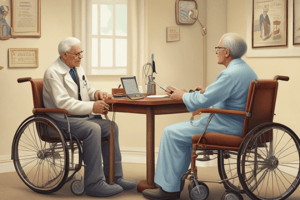Podcast
Questions and Answers
What is the primary goal of Geriatric Medicine?
What is the primary goal of Geriatric Medicine?
- To completely eradicate all diseases in older people.
- To maximize ability and promote independent living for ill and disabled older people. (correct)
- To focus solely on the clinical aspects of illness in older people.
- To prolong life expectancy regardless of quality of life.
Which of the following is the most prevalent form of dementia?
Which of the following is the most prevalent form of dementia?
- Parkinson's disease with dementia
- Vascular dementia
- Alzheimer's disease (correct)
- Lewy body dementia
According to the provided content, what happens to the incidence of dementia in five-year increments after age 65?
According to the provided content, what happens to the incidence of dementia in five-year increments after age 65?
- The incidence remains constant.
- The incidence decreases by 50%.
- The incidence increases linearly.
- The incidence doubles. (correct)
According to the reference diagram, which of the following is NOT a determinant of Active Ageing?
According to the reference diagram, which of the following is NOT a determinant of Active Ageing?
What is a key reason given in the text as to why older people need special medical skills?
What is a key reason given in the text as to why older people need special medical skills?
Flashcards
Geriatric Medicine
Geriatric Medicine
The branch of medicine focused on the health of older adults. This includes diagnosing and treating illnesses, preventing diseases, and addressing social needs, including their slower response to treatment.
Alzheimer's Disease
Alzheimer's Disease
A type of dementia that affects memory, thinking, and behavior. It's the most common type of dementia, accounting for 50-60% of all dementia cases.
Active Aging
Active Aging
The process of aging in a way that allows people to maintain their physical and cognitive function, social engagement, and overall well-being.
Determinants of Active Aging
Determinants of Active Aging
Signup and view all the flashcards
Geriatric Imperative
Geriatric Imperative
Signup and view all the flashcards
Study Notes
Geriatrics Medicine
- Geriatrics is the branch of general medicine focusing on the clinical, preventative, and social aspects of illness in older adults.
- It addresses high morbidity rates in older adults.
- Disease presentation differs in older people, often with a slower response to treatment.
- Special medical skills are needed to support ill and disabled elderly.
- The goal is to restore individuals to maximum ability and independent living at home.
Why Geriatric Medicine?
- The "Geriatric Imperative" is driven by a growing elderly population and unmet healthcare needs.
- Increasing elderly population results in an increased need for geriatric care.
- Significant unmet healthcare needs for the aging population.
Age-Associated Factors
- Cardiovascular disease
- Diabetes
- Arthritis
- Osteoporosis
- Cerebrovascular disease
- Alzheimer's disease
- Chronic respiratory disease
- Cancers
- Depression
Alzheimer's Disease
- Alzheimer's disease is the most common form of dementia.
- It accounts for 50-60% of all dementia cases.
- Risk of dementia increases with age, with a doubling of incidence in each five-year age group over 65.
- Among individuals over 80, one in five are likely to be affected, compared to only 1% of those aged 65.
Healthy Aging Life Style Modifications
- Diet and nutrition
- Exercise
- Weight management
- Smoking cessation
- Alcohol moderation
- Social activities
Determinants of Active Aging (WHO)
- Active aging is influenced by social determinants, physical environment, personal determinants, economic determinants, health and social services, culture, and behavioural determinants.
- This model highlights the interconnectedness of factors impacting aging.
Education and Training
- There's a global need to enhance educational opportunities in geriatrics and gerontology for healthcare professionals.
- Increased training for professionals working with older adults is necessary.
- Training on health and older persons for the social service sector is also important.
Preventive Health Care in Elderly
- Primary Prevention: focusing on healthy habits, managing coronary disease risk factors, immunizations, injury prevention, and osteoporosis prevention.
Secondary Prevention
- Secondary prevention focuses on screening, and managing nutrition-related anemias, fall risk, and syphilis with a focus on prevention of stroke.
Tertiary Prevention
- Rehabilitation and caregiver support are key strategies for tertiary prevention.
Studying That Suits You
Use AI to generate personalized quizzes and flashcards to suit your learning preferences.




